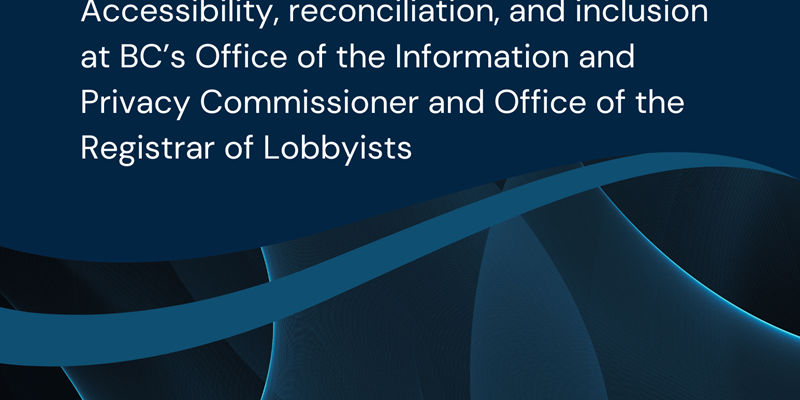
Accessiblity, reconciliation, and inclusion at BC's Office of the Information and Privacy Commissioner and Office of the Registrar of Lobbyists
To read the full report: https://www.oipc.bc.ca/documents/special-reports/2870
Accessibility plan: pages 11-15
Reconciliation plan: pages 16-19
Diversity, equity, and inclusion plan: pages 20-22
To provide feedback: https://www.oipc.bc.ca/forms/accessibility-reconciliation-and-inclusion-feedback-form/
Commissioner's Message
It is my honour to present this Special Report on accessibility, reconciliation and inclusion at BC’s Office of the Information and Privacy Commissioner and the Office of the Registrar of Lobbyists.
The OIPC/ORL has a longstanding commitment to these values. To assist with this work and to provide a clear path forward, we created our READI+ (Reconciliation, Equity, Accessibility, Diversity, and Inclusion +) group, which was tasked in 2019 to identify gaps and provide recommended actions to address them in a structured way. As part of that process, we have listened, learned and made some important changes. This report documents some of the progress we’ve made to date, identifies where more work needs to be done, and invites your feedback. It is intended as a living document, that we will update based on feedback and consultations.
The Accessible BC Act requires public bodies to “develop a plan to identify, remove and prevent barriers to individuals in or interacting with the organization.” Our plan is included here (p.11). We have also taken this opportunity to share our work to ensure that along with being more accessible, our offices and the services we provide advance reconciliation with Indigenous peoples in this province, and reflect our support for diversity, equity and inclusion.
While this report includes the details of the work we’ve done and what we plan to do, it also asks questions. How can we make our services more accessible? How can the work we do better reflect and speak to the incredible diversity of this province? How are we contributing to reconciliation with Indigenous peoples, on whose lands we are fortunate to live and work? How can we ensure that every staff member feels included, seen, and appreciated? What are we doing right in these areas, and how can we improve? As this is a living document –we pose these questions in earnest and welcome feedback from all people living in British Columbia.
I would like to thank my staff, who prepared this report and led the efforts it details. This is the work of many hands – dedicated public servants who strive for excellence in the services they provide to the public, and who, as this report illustrates, recognize and respond to the many dimensions of what that involves. And I thank, in advance, those who provide feedback as we continue this important journey.
Priorities and Actions |
Status |
Accessibility |
|
|
Reviewing and updating plan (Actions 1-3) |
|
|
1. Develop an accessibility plan to identify, remove and prevent barriers to individuals in or interacting with the OIPC/ORL. |
Ongoing |
|
2. Consult with OIPC/ORL staff, joint accessibility committee, members of the public, and interested parties on the contents of the plan. |
Ongoing |
|
3. Review and update the plan at least annually, considering comments received from the public and the joint accessibility committee. |
2025 |
|
Making the OIPC office more accessible (Actions 4-5) |
|
|
4. Review and update lighting and signage throughout the office to ensure it is clear. |
Ongoing |
|
5. Proceed with updating the washrooms on the second and fourth floors of the building to enhance accessibility. |
Ongoing |
|
Improving digital accessibility (Actions 6-11) |
|
|
6. Add alt text and image descriptions to the OIPC/ORL websites to ensure screen readers can access visual content. |
9 months |
|
7. Improve colour contrast options on the OIPC/ORL websites and on other digital content. |
3 months |
|
8. Provide content from key published materials in a variety of mediums (infographics, video, summaries, etc). |
Ongoing |
|
9. Integrate accurate closed captions on published videos. |
Ongoing |
|
10. Provide language translation options for OIPC/ORL website content and documents. |
Ongoing |
|
11. Integrate plain-language writing for public-facing documents. |
Ongoing |
|
Supporting mental health and neurodivergence (Actions 12-13) |
|
|
12. Offer staff training to encourage education on mental health and neurodivergence. |
Ongoing |
|
13. Offer staff resources through the Canadian Mental Health Association to support workplace and personal mental health. |
Ongoing |
Reconciliation |
|
|
Building relationships with Indigenous peoples in BC (Actions 14-16) |
|
|
14. Identify and build relationships with the Indigenous peoples on whose territory the office carries out its operations. |
Ongoing |
|
15. Identify and build relationships with Indigenous groups and peoples in BC that know about Indigenous legal orders, whether traditional, modern or emerging, particularly as those legal orders relate to the areas of access, privacy, lobbying and dispute resolution. |
Ongoing |
|
16. The Commissioner and delegates will include a territorial acknowledgement when engaged in presentations, in email signature blocks, on the websites, and in reports such as the Annual Report. |
Ongoing |
|
Listening and learning about historic and ongoing experiences from Indigenous peoples in BC (Actions 17-20) |
|
|
17. Learn about Indigenous legal orders in BC, and in particular as they relate to dispute resolution, or access, privacy, and lobbying. |
Ongoing |
|
18. Learn about Indigenous initiatives relating to data governance and data sovereignty. |
Ongoing |
|
19. Require all staff and new staff as they are hired to complete Anti-Racism Indigenous Cultural Safety Training Program, if a similar or equivalent training has not already been completed. |
Ongoing |
|
20. Continue to develop cultural competency in working with Indigenous peoples to support OIPC/ORL as a safe place for Indigenous peoples to access resolution of their disputes. |
Ongoing |
|
Reviewing processes to provide safe space for Indigenous peoples (Actions 21-28) |
|
|
21. Learn from what others have done to support reconciliation, including counterparts across the country, and other administrative tribunals in BC. |
0-24 months |
|
22. Address barriers identified by Indigenous people when accessing OIPC/ORL services or engaging in OIPC/ORL procedures |
Ongoing |
|
23. Review feedback and provide options to accommodate Indigenous means of resolving disputes with the consent of the parties, if possible. |
12-36 months |
|
24. Continue to learn and apply trauma-informed practices in OIPC/ORL procedures. |
Ongoing |
|
25. Include Indigenous cultural competencies in all job postings. |
Ongoing |
|
26. Expand the reach of job postings to places that are accessible to Indigenous candidates. |
6-24 months |
|
27. Plan for and develop a rewarding work experience for an Indigenous coop placement through the BC Government’s Indigenous Youth Internship Program. |
12-24 months |
|
28. Review and update the plan on an ongoing basis, and at least annually, with a view to feedback from Indigenous peoples and advisors, learnings from Indigenous peoples, and reflections from staff. |
12 months |
Diversity, equity, and inclusion |
|
|
Developing, implementing and reviewing processes (Actions 29-32) |
|
|
29. Develop an internal READI+ process guide that explains the decision-making process and identifies roles, and how decisions are made. |
3 months |
|
30. Prioritize gender inclusive language in external communications, including reports, guidance documents, and forms. |
Ongoing |
|
31. Expand and promote online and verbal translation service projects to serve diverse communities. |
12 months |
|
32. Review the Diversity, Equity, and Inclusion plan and priorities annually. |
12 months |
|
Creating and promoting an inclusive work culture (Actions 33-37) |
|
|
33. Maintain detailed onboarding processes and forms to promote wellbeing of staff working remotely or in the office. |
Ongoing |
|
34. Develop and implement a guide for inclusive meetings that includes templates for accessible PowerPoint presentations, a checklist for presenters, and considerations for alternative ways to participate. |
12 months |
|
35. Provide flexible work arrangements, with a continued focus on employee wellbeing and work-life balance. |
Ongoing |
|
36. Safeguard employees’ mental wellbeing through anti-bullying and anti-harassment policies. |
Ongoing |
|
37. Encourage employees to advance ideas related to accessibility, reconciliation, diversity, equity, and inclusion through the READI+ committee and/or senior staff. |
Ongoing |
|
Encouraging education (Action 38) |
|
|
38. Provide consistent training through webinars and all-staff meetings to support diversity, equity, and inclusion in both internal and external OIPC/ORL processes, including on reconciliation, mental health and neurodivergence, and other topics. |
Ongoing |


